

Research profiles descriptors. This new draft classification aims to communicate the various characteristics that researchers may have throughout their career.
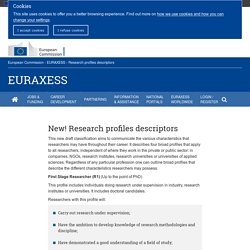
It describes four broad profiles that apply to all researchers, independent of where they work in the private or public sector: in companies, NGOs, research institutes, research universities or universities of applied sciences. Regardless of any particular profession one can outline broad profiles that describe the different characteristics researchers may possess. First Stage Researcher (R1) (Up to the point of PhD) This profile includes individuals doing research under supervision in industry, research institutes or universities.
It includes doctoral candidates. Research methods. After you have defined your research worthy problem and completed a preliminary reading of the existing literature about the problem, you need to gather more information and probably also empirical data to write your thesis.
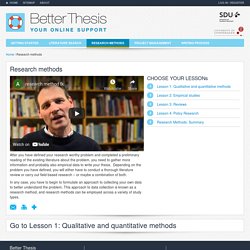
Depending on the problem you have defined, you will either have to conduct a thorough literature review or carry out field based research – or maybe a combination of both. In any case, you have to begin to formulate an approach to collecting your own data to better understand the problem. CRediT – Contributor Roles Taxonomy. Office of Career and Professional Development. General format: Academic CVs follow a fairly standard format, which can be anywhere from 2 to 15 pages long.
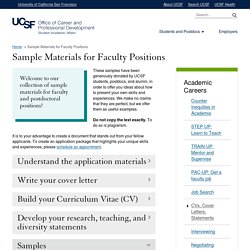
A CV should list all experience relevant to an academic position. Keep fonts coherent. Office of Career and Professional Development. Teaching and Research Statements. Publications – Institute of Science, Technology and Policy. Homepage – Institute of Science, Technology and Policy. Technology and Policy Program < MIT. The Master of Science in Technology and Policy is an engineering research degree with a strong focus on the role of technology in policy formulation, analysis, and evaluation.
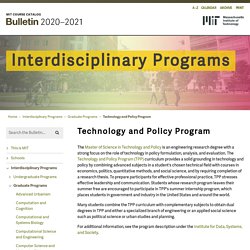
The Technology and Policy Program (TPP) curriculum provides a solid grounding in technology and policy by combining advanced subjects in a student's chosen technical field with courses in economics, politics, quantitative methods, and social science, and by requiring completion of a research thesis. To prepare participants for effective professional practice, TPP stresses effective leadership and communication. Students whose research program leaves their summer free are encouraged to participate in TPP's summer internship program, which places students in government and industry in the United States and around the world.
Technology & Policy Research Initiative. Background Technological innovation has driven economic growth and dramatically boosted the quality of life over the last two centuries.
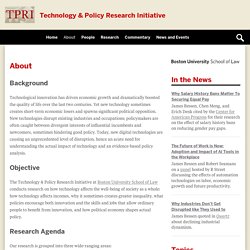
Yet new technology sometimes creates short-term economic losers and spawns significant political opposition. New technologies disrupt existing industries and occupations; policymakers are often caught between divergent interests of influential incumbents and newcomers, sometimes hindering good policy. Today, new digital technologies are causing an unprecedented level of disruption, hence an acute need for understanding the actual impact of technology and an evidence-based policy analysis.
Objective. Faculty Position in Techology & Policy ‒ Working ‐ EPFL. Write … One Note at at Time. Romain Brette. Computational Materials Science. Computational Materials Science, Master's Programme (Two-Year) - Education - Malmö University. Syllabus for students admitted autumn 2021 Programme Code: TACMA revision 4 Swedish name: Beräkningsbaserad materialvetenskap, masterprogram Language:
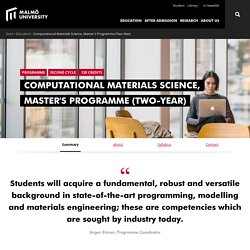
Faculty Position in Electrical and Power Systems (Simon Fraser University School of Sustainable Energy Engineering ) Sustainable Energy Engineering: Tenure-Track Faculty Positions The School of Sustainable Energy Engineering at Simon Fraser University (SFU), located on unceded Coast Salish Territory - the traditional territories of the Squamish (Sḵwx̱wú7mesh Úxwumixw), Tsleil-Waututh, Musqueam (xʷməθkʷəy̓əm), and Kwikwetlem First Nations - is actively building a diverse, inclusive community and invites applications for Tenure-Track Faculty positions in the following areas: Area I: Electrical and Power Systems.Area II: Materials for Energy Systems.Area III: Thermo-Fluids.
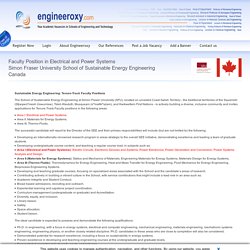
UW-Madison Writer’s Handbook – The Writing Center – UW–Madison. Attribution-NonCommercial-ShareAlike This license lets you remix, adapt, and build upon the Writer’s Handbook non-commercially, as long as you credit University of Wisconsin-Madison Writing Center and license your new creations under the identical terms.
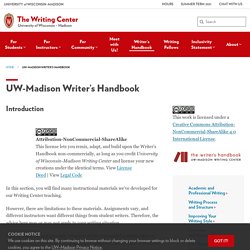
View License Deed | View Legal Code In this section, you will find many instructional materials we’ve developed for our Writing Center teaching. However, there are limitations to these materials. Assignments vary, and different instructors want different things from student writers. Therefore, the advice here may or may not apply to your writing situation. Planning your Academic Career for Upcoming Professors (PAC-UP) The job talk for a faculty position Not exactly ready for your job talk?
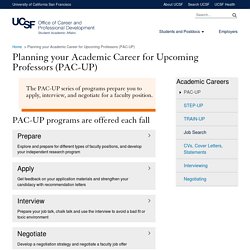
These workshops will cover the in's and out's of giving a good job talk. Demonstration: Giving a chalk talk for a faculty position. Planning Your Academic Career for Upcoming Professors. New Programs and Resources Preparing for a faculty position?
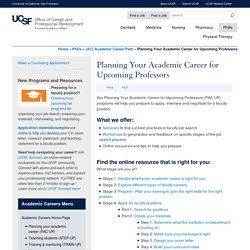
Check out our upcoming fall programs for organizing your job search, preparing your materials, interviewing, and negotiating. Application materials samples are online to help you develop your CV, cover letter, research statement, and teaching statement for a faculty position. Need help navigating your career? Research statements for faculty job applications – Career Services. The Purpose of a Research Statement The main goal of a research statement is to walk the search committee through the evolution of your research, to highlight your research accomplishments, and to show where your research will be taking you next.
To a certain extent, the next steps that you identify within your statement will also need to touch on how your research could benefit the institution to which you are applying. This might be in terms of grant money, faculty collaborations, involving students in your research, or developing new courses. Your CV will usually show a search committee where you have done your research, who your mentors have been, the titles of your various research projects, a list of your papers, and it may provide a very brief summary of what some of this research involves. Writing a Research Plan. Nearly every applicant for a tenure-track faculty job is expected to include a research plan. Exceptions are rare. Just as rare are programs designed to help doctoral students and postdocs learn how to create a research plan.
Which is too bad: Writing an effective research plan is tricky. The Spread of Inequality. The causes of socioeconomic inequality have been debated since the time of Plato. Many reasons for the development of stratification have been proposed, from the need for hierarchical control over large-scale irrigation systems to the accumulation of small differences in wealth over time via inheritance processes. However, none of these explains how unequal societies came to completely displace egalitarian cultural norms over time. Our study models demographic consequences associated with the unequal distribution of resources in stratified societies. How to Write Guide: Introduction to Journal-Style Scientific Writing. Introduction to Journal-Style Scientific Writing [ Table of Contents ] [ PDF Version ] | Get Your Thoughts Organized | Who is Your Audience? | Prose and Style | Abbreviations and Tense | First vs. Third Person | Use Active Verbs | References | Plagiarism Overview A critical aspect of the scientific process is the reporting of new results in scientific journals in order to disseminate that information to the larger community of scientists.
Communication of your results contributes to the pool of knowledge within your discipline (and others!) And very often provides information that helps others interpret their own experimental results. Style Guide. Test « The Writer’s Diet. The Book Is your writing flabby or fit? If your sentences are weighed down with passives and prepositions, be-verbs and waste words, The Writer’s Diet is for you – a practical, punchy introduction to good writing. The Test Use the online WritersDiet Test to identify paunchy prose, then follow the no-nonsense advice in the book to strengthen and tone your verbal muscles. Writing the Teaching Statement. Six Tips for Writing an Effective Teaching Statement. Teaching Statement Workshop Slides 2017.
Research Statement : Graduate School.